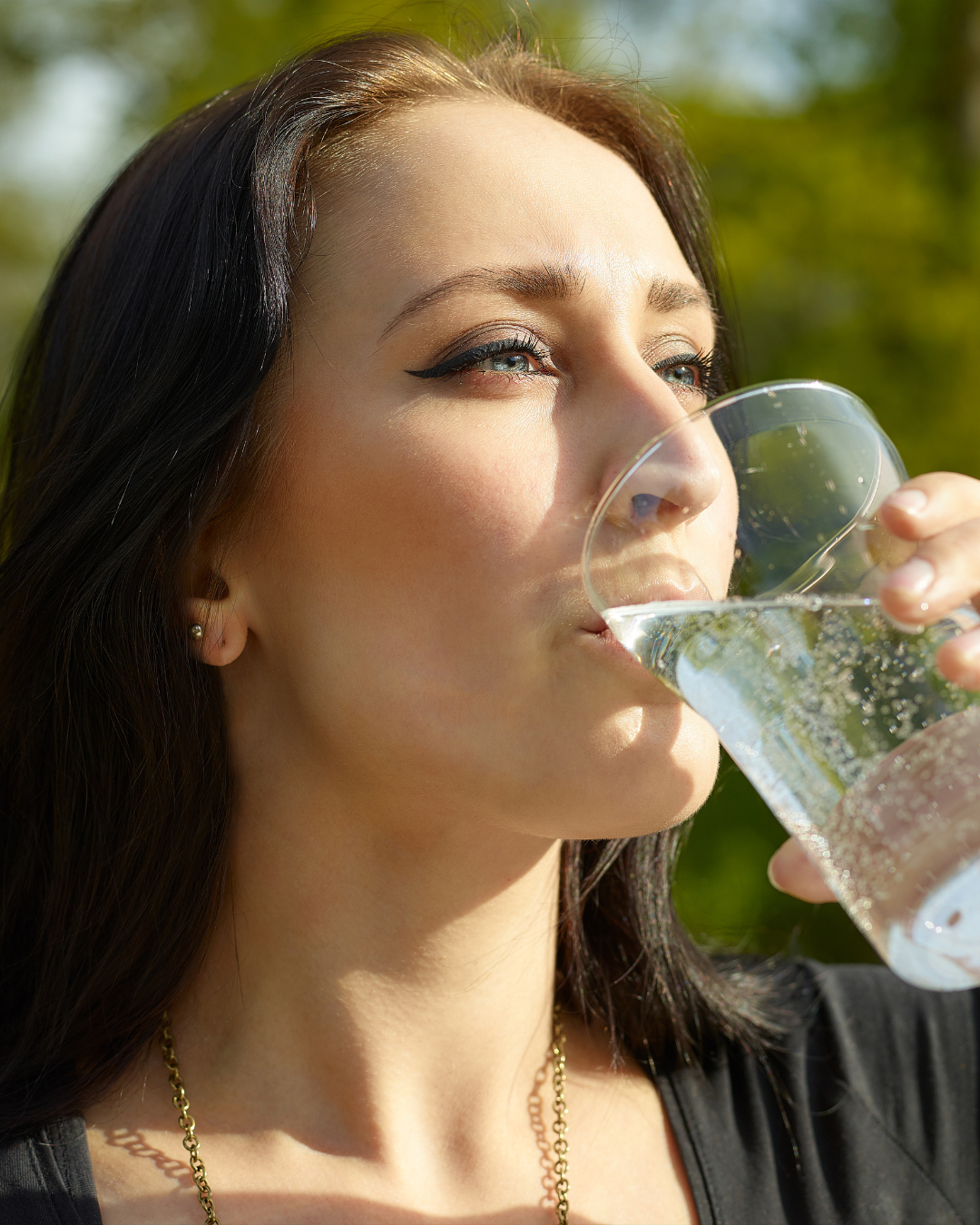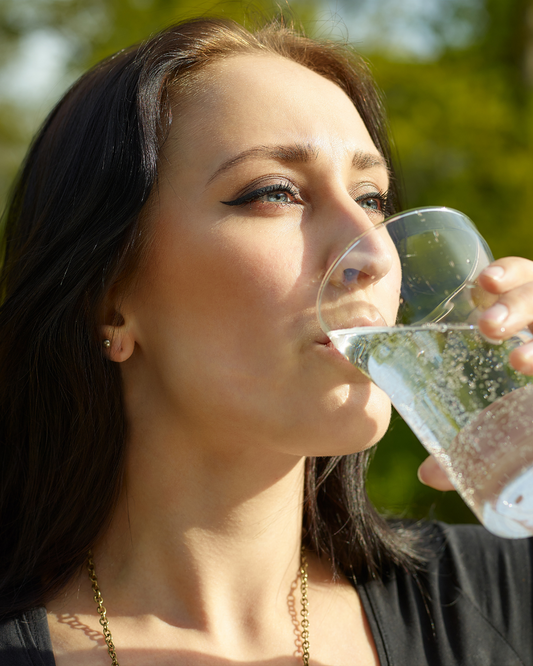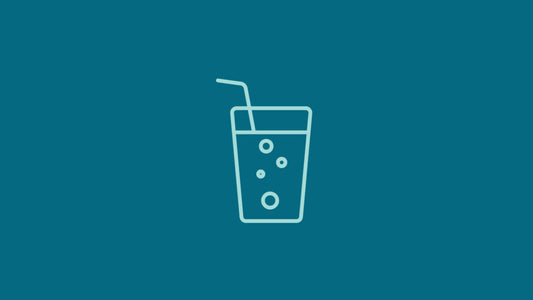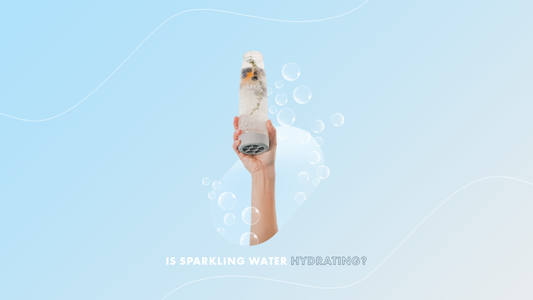Sparkling water has become quite trendy over the last couple of years. People love its refreshing taste and bubbly texture. It comes in so many different variations, from regular plain fizzy water to fruit juice-filled acidic drinks, that it can be difficult to know what is good for you and what you should stay away from. To clear up some common misconceptions about sparkling water and dental health, we created this expert guide with everything you need to know.
What makes water “sparkling”?
Most people know that sparkling water contains bubbles, but what makes those bubbles pop? How do they form? Let's take a look at how carbonation works. The process begins when carbon dioxide gas dissolves in water.
This reaction creates carbonic acid, which is why carbonated beverages taste sour. To inject carbon dioxide into water, all you need are carbonators and a soda maker. The carbonator mixes with water in a sealed chamber to generate the perfect amount of CO2 to sparkle one bottle. Once the carbon dioxide is dissolved into the water, there aren't many places left for the gas molecules to go. As a result, the water becomes supersaturated and starts to bubble. When the pressure drops, the bubbles burst and release carbon dioxide.
Can sparkling water damage your teeth?
It’s a common misconception that drinking a lot of sparkling water can damage your teeth. In fact, carbonated drinks may actually be good for your teeth. They help cleanse your teeth and prevent cavities. However, if you're drinking soda with added sweeteners or acids, then you could be doing more damage than good.
That's because the acids in these drinks erode your teeth's protective surface layer called (tooth enamel). In addition, the high levels of sugar in these drinks increase your risk of cavities. Therefore, if you want to enjoy a glass of sparkling water every now and then, you should do so without adding any harmful artificial flavoring, instead, opt for natural flavoring like fresh fruit,
Should I brush my teeth after drinking sparkling water?
You don’t need to brush your teeth after drinking sparkling water if you haven’t added anything harmful to it. Sugary drinks which have been loaded with citric acids are what cause enamel erosion, tooth decay, and tooth sensitivity, but if you enjoy a plain glass of sparkling water, there is no danger to your oral health.
At the end of the day, sparkling water is no different from ordinary water, so there is very little potential damage that may occur. However, you should brush your teeth after sugary beverages with high acid levels, such as cola or lemonade.
4 tips to enjoy sparkling water and protect your teeth
While sparkling water may be great for a healthy lifestyle, there are some things you can do to ensure that you get all the benefits without harming your smile.
Don’t add citrus fruits to your carbonated drinks (or do so in moderation!)
People often add slices of lemon or orange to flavor their carbonated beverages. While these fruits are healthy to consume, they can harm your teeth because the acids present in citrus fruits can erode tooth enamel. It’s therefore recommended that you drink only plain carbonated beverages or, if you want to enjoy infused carbonated beverages mixed with fresh lemon or orange juice, you do so in moderation.
Drink your soda water with a meal
It is true that the length of time that teeth are exposed to acidic substances affects tooth decay. If you drink things like coffee or soft drinks throughout the day and between mealtimes, your teeth are exposed to acids longer than if you consume them with food. Sipping sparkling water with meals helps keep your mouth fresh whilst also minimizing the time it’s in direct contact with your teeth as your food acts as somewhat of a barrier.
Drink your sparkling water with a straw
Drinking any kind of soft drink with a straw will minimize the likelihood of it causing tooth erosion, and the same is true for sparkling water. This is a very simple trick that makes complete sense when you think about it. Your teeth are only going to be affected by what you put in contact with them, therefore if you are looking to minimize the effects of any acidic beverages or sparkling water, simply reduce the contact it has with the tooth surface.
Avoid drinking carbonated water when dehydrated
This tip might sound counterintuitive because sparkling water is known to be a good hydrator, but you actually increase the risk of damage to your teeth when you drink any drink with varying degrees of carbonation when dehydrated. This is because human saliva helps to neutralize the acid in drinks. When you’re dehydrated, you have less saliva in your mouth and are therefore less capable of breaking down the acid from your favorite bubbly beverage, which could cause problems for otherwise healthy teeth.
Shop for Spärkel beverage systems
Although many fear that drinking sparkling water will lead to dental erosion, the truth is that it is extremely unlikely. Sparkling water is a healthy alternative to many of the popular beverages on the market today.
At Spärkel, our mission is simple: to offer the most innovative sparkling beverage technology for a healthy lifestyle and a healthy planet. This is why our Spärkel carbonators use 97% less plastic waste per drink than store-bought bottles. Not to mention that for every Spärkel carbonator sold, we collect the same amount of ocean-bound plastic from the environment through our partnership with CleanHub. With no CO2 tank needed and five different bubble levels, you can effortlessly create the perfect drink within a matter of minutes.




